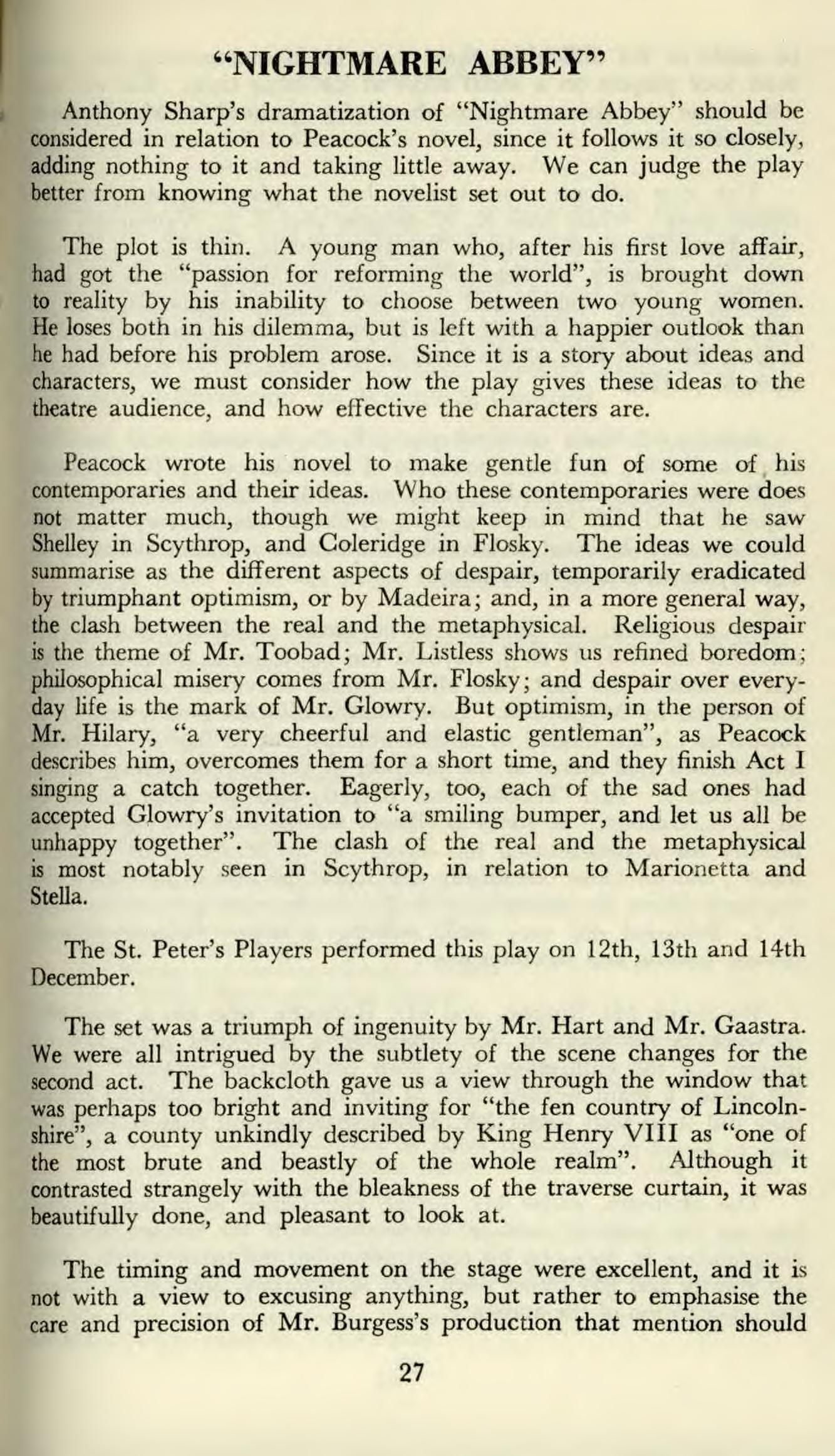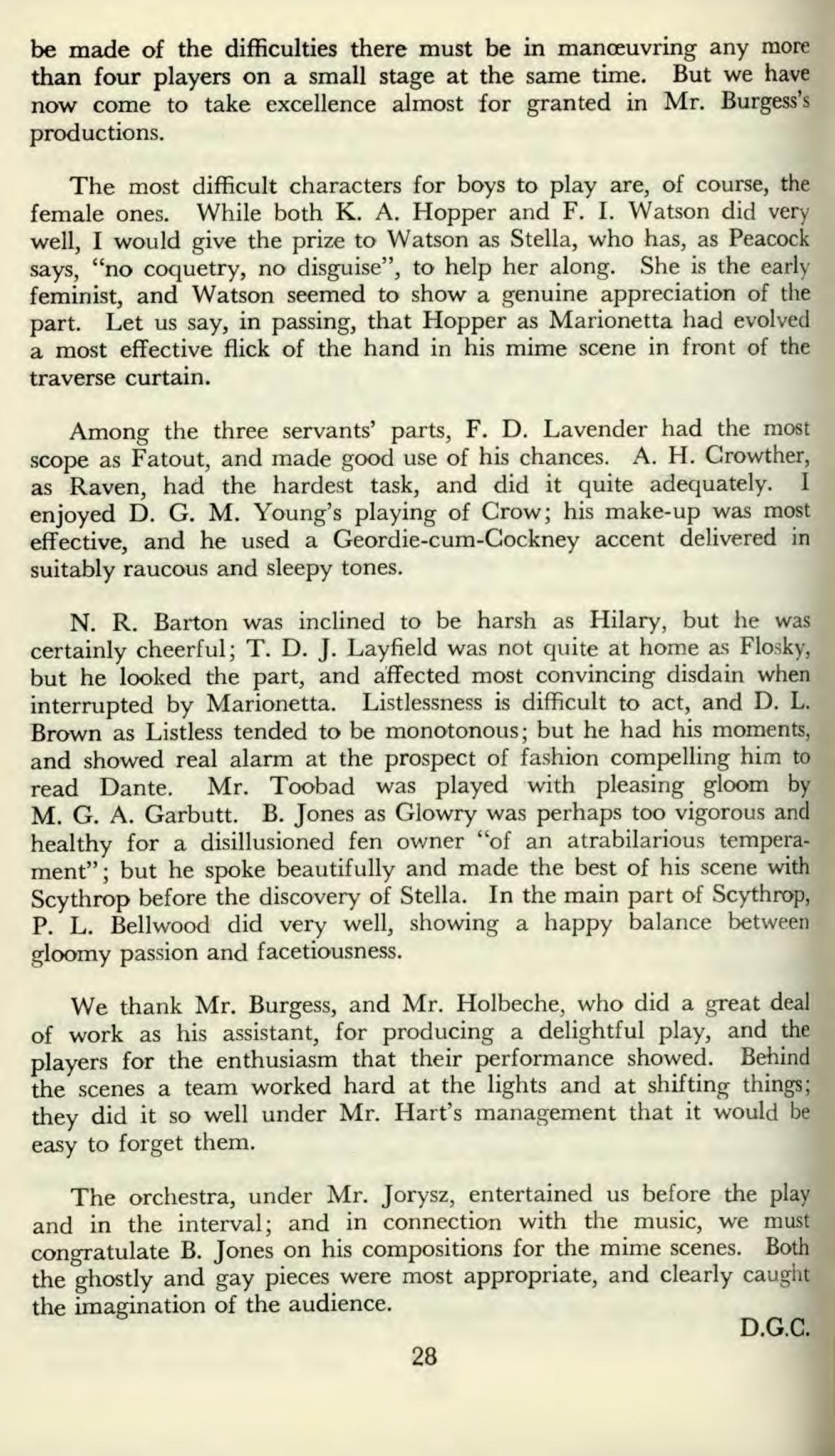
4 minute read
The School Play
from Feb 1958
by StPetersYork
Anthony Sharp's dramatization of "Nightmare Abbey" should be considered in relation to Peacock's novel, since it follows it so closely, adding nothing to it and taking little away. We can judge the play better from knowing what the novelist set out to do.
The plot is thin. A young man who, after his first love affair, had got the "passion for reforming the world", is brought down to reality by his inability to choose between two young women. He loses both in his dilemma, but is left with a happier outlook than he had before his problem arose. Since it is a story about ideas and characters, we must consider how the play gives these ideas to the theatre audience, and how effective the characters are.
Peacock wrote his novel to make gentle fun of some of his contemporaries and their ideas. Who these contemporaries were does not matter much, though we might keep in mind that he saw Shelley in Scythrop, and Coleridge in Flosky. The ideas we could summarise as the different aspects of despair, temporarily eradicated by triumphant optimism, or by Madeira; and, in a more general way, the clash between the real and the metaphysical. Religious despair is the theme of Mr. Toobad; Mr. Listless shows us refined boredom; philosophical misery comes from Mr. Flosky; and despair over everyday life is the mark of Mr. Glowry. But optimism, in the person of Mr. Hilary, "a very cheerful and elastic gentleman", as Peacock describes him, overcomes them for a short time, and they finish Act I singing a catch together. Eagerly, too, each of the sad ones had accepted Glowry's invitation to "a smiling bumper, and let us all be unhappy together". The clash of the real and the metaphysical is most notably seen in Scythrop, in relation to Marionetta and Stella.
The St. Peter's Players performed this play on 12th, 13th and 14th December.
The set was a triumph of ingenuity by Mr. Hart and Mr. Gaastra. We were all intrigued by the subtlety of the scene changes for the second act. The backcloth gave us a view through the window that was perhaps too bright and inviting for "the fen country of Lincolnshire", a county unkindly described by King Henry VIII as "one of the most brute and beastly of the whole realm". Although it contrasted strangely with the bleakness of the traverse curtain, it was beautifully done, and pleasant to look at.
The timing and movement on the stage were excellent, and it is not with a view to excusing anything, but rather to emphasise the care and precision of Mr. Burgess's production that mention should
be made of the difficulties there must be in manoeuvring any more than four players on a small stage at the same time. But we have now come to take excellence almost for granted in Mr. Burgess's productions.
The most difficult characters for boys to play are, of course, the female ones. While both K. A. Hopper and F. I. Watson did very well, I would give the prize to Watson as Stella, who has, as Peacock says, "no coquetry, no disguise", to help her along. She is the early feminist, and Watson seemed to show a genuine appreciation of the part. Let us say, in passing, that Hopper as Marionetta had evolved a most effective flick of the hand in his mime scene in front of the traverse curtain.
Among the three servants' parts, F. D. Lavender had the most scope as Fatout, and made good use of his chances. A. H. Crowther, as Raven, had the hardest task, and did it quite adequately. I enjoyed D. G. M. Young's playing of Crow; his make-up was most effective, and he used a Geordie-cum-Cockney accent delivered in suitably raucous and sleepy tones.
N. R. Barton was inclined to be harsh as Hilary, but he was certainly cheerful; T. D. J. Layfield was not quite at home as Flosky, but he looked the part, and affected most convincing disdain when interrupted by Marionetta. Listlessness is difficult to act, and D. L. Brown as Listless tended to be monotonous; but he had his moments, and showed real alarm at the prospect of fashion compelling him to read Dante. Mr. Toobad was played with pleasing gloom by M. G. A. Garbutt. B. Jones as Glowry was perhaps too vigorous and healthy for a disillusioned fen owner "of an atrabilarious temperament"; but he spoke beautifully and made the best of his scene with Scythrop before the discovery of Stella. In the main part of Scythrop, P. L. Bellwood did very well, showing a happy balance between gloomy passion and facetiousness.

We thank Mr. Burgess, and Mr. Holbeche, who did a great deal of work as his assistant, for producing a delightful play, and the players for the enthusiasm that their performance showed. Behind the scenes a team worked hard at the lights and at shifting things; they did it so well under Mr. Hart's management that it would be easy to forget them.
The orchestra, under Mr. Jorysz, entertained us before the play and in the interval; and in connection with the music, we must congratulate B. Jones on his compositions for the mime scenes. Both the ghostly and gay pieces were most appropriate, and clearly caught the imagination of the audience. D.G.C.










